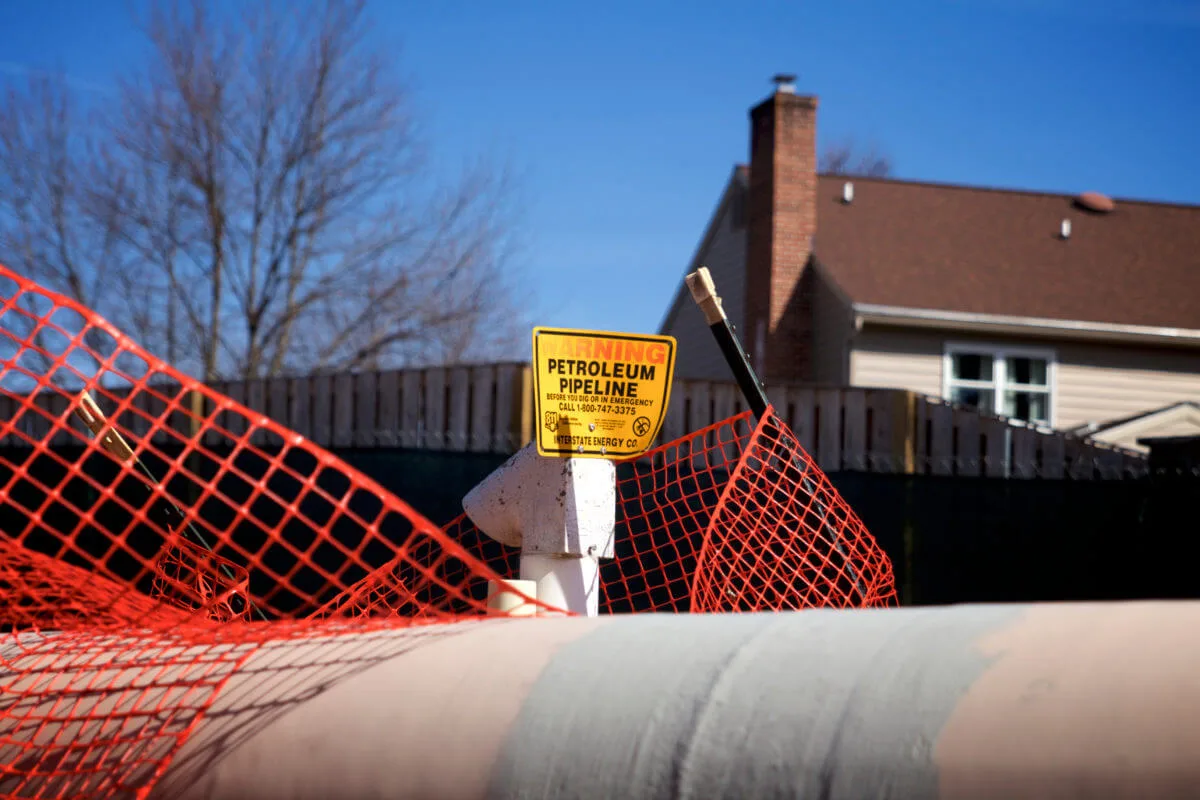
Regulators fined Energy Transfer $30 million, and lifted a freeze on the builder’s other construction projects—including the controversial Mariner East pipeline.
Sixteen months after a gas pipeline explosion turned the night sky orange and forced 25 families to evacuate their homes in Center Township, Beaver County, the state has issued a record fine against the company responsible for the blast.
The Pennsylvania Department of Environmental Protection (DEP) announced last week that ETC Northeast Pipeline (ETC), a subsidiary of Energy Transfer Partners, must pay $30.6 million for violations and oversights that contributed to the September 2018 explosion, in which a landslide caused the Revolution pipeline to split open.
The 40-mile pipeline had only been operational for a week when the explosion occurred.
No one was injured in the blast, but it sent flames 150 feet into the air and destroyed one house, a barn, and several vehicles. The explosion also damaged local wetlands and several electric transmission towers.
The fine is the largest ever levied by the state agency, and is part of a settlement agreement that also ends a permit freeze on the Energy Transfer’s other projects, including the Mariner East pipelines, a multibillion-dollar project that’s proved controversial.
A DEP investigation found that ETC failed to stabilize 19 different hillside portions of the Revolution pipeline, causing additional slides, and failed to correctly implement hundreds of “best management practices,” standards required by state permits.
The agency also documented hundreds of instances of erosion and sedimentation and found that ETC illegally destroyed at least 23 streams during construction and eliminated at least 17 wetland areas by “manipulating and/or filling wetlands with soil.”
According to the consent agreement, the company had evidence the Center Township hillside was slip-prone, citing a January 2016 Energy Transfer analysis finding that the incident site had a “high susceptibility to slope failure” and a 2018 “slip” on the hillside just 30 feet from where the pipe ultimately ruptured. The company tried to restore the hillside, but failed to consult with an engineer or any kind of geotechnical expert, the DEP found.
DEP Secretary Patrick McDonnell said in a statement that the fine’s size was in part due to the company’s failure to comply with an order the agency issued one month after the explosion, calling for ETC to address erosion, sedimentation, and stability issues present in the pipeline project.
As part of the settlement, the state will lift its nearly year-long permit freeze on Energy Transfer’s other pipeline projects, including the 350-mile Mariner East 2 and 2X pipelines. The Mariner East project, one of the largest construction projects in state history, will transport natural gas products from western Pennsylvania to a refinery just outside of Philadelphia.
Environmental advocates say they are dismayed at the details of the settlement.
“ETC’s recidivist behavior should disqualify it from getting any more chances to do business in Pennsylvania. We have no reason to believe that anything will change as a result of this fine and the assurances the company has given the DEP,” Karen Feridun, co-founder of the Better Path Coalition, a coalition of environmental groups, said in an emailed statement. “The moratorium on issuing permits to ETC should be made permanent and all existing permits should be rescinded.”
Food & Water Action’s Eastern Pennsylvania Organizer Sam Rubin also released a statement, calling for Gov. Tom Wolf to “protect communities” who stand to be harmed by ETC’s future projects. “This fine is not designed to hold Sunoco [a part of Energy Transfer Partners] accountable for its illegal activity, it is about re-starting work on Mariner East 2, a dangerous project designed to carry hazardous gas liquids hundreds of miles in order to make more plastic,” he said.
ETC, however, maintains that it is determined to abide by state rules and regulations moving forward, and championed the “economic benefits of these projects,” according to a spokesperson.
Pipeline industry leaders have also praised the agreement. “Completion of this project is essential,” Kurt Knaus, a spokesman for Pennsylvania Energy Infrastructure Alliance, said in a statement. “Skilled laborers who have been waiting to get back to work will finally be back on the job, putting their training to use for the safe, responsible development of critical infrastructure. This announcement is a positive start to 2020.”
A 2018 analysis found that the Mariner East network represents a one-time economic impact of nearly $9.1 billion for Pennsylvania. But the report has proven controversial as it failed to factor in social and environmental costs and has been criticized by economists as being “incomplete” and “misleading.” One homeowner concerned about the public health impacts of the pipeline even referred to it as “economic propaganda.”
Under the DEP settlement, $28.6 million of the overall fine will go to the state’s Oil and Gas Program Fund and Clean Water Fund, which will be put toward the agency’s oversight of related projects statewide while also providing financial assistance to water remediation projects across the state. The other $2 million will go toward DEP-approved community environmental projects.
The settlement also requires ETC to restore the explosion site in Center Township and other damaged wetlands and to monitor the blast site for at least five years.
Should ETC fall into noncompliance, the state could once again reinstate a hold on all permits. The company could also face fines of $20,000 per day, per violation, if it fails to meet the terms and timelines agreed upon in the settlement.
“DEP will continue to carefully monitor ETC’s activities to ensure that ETC meets the terms of this agreement and all approved permits,” said DEP Secretary McDonnell. “The conditions imposed by this agreement seek to ensure that ETC will get this right. Anything less is unacceptable.”
Feridun of Better Path Coalition, however, is unimpressed. “DEP’s action is an inauspicious start to the last decade we have left to avoid climate disaster,” she said.
Politics

Biden announces tariffs on Chinese Steel while visiting United Steelworkers members
“I'm president because of you guys. I really am and I'm proud. As was mentioned earlier, I'm proud to be the most pro-union president in American...

Opinion: Is Reproductive Healthcare just a women’s issue?
In this op-ed, Pennsylvania resident Lynn Strauss discusses the Republican Party’s conflicting stance on reproductive healthcare policy and the...

2 top US gun parts makers agree to temporarily halt sales in Pennsylvania
Philadelphia filed suit against Polymer80 and JSD Supply last year, accusing the manufacturers of perpetuating gun violence by manufacturing ghost...
Local News

Conjoined twins from Berks County die at age 62
Conjoined twins Lori and George Schappell, who pursued separate careers, interests and relationships during lives that defied medical expectations,...

Railroad agrees to $600 million settlement for fiery Ohio derailment, residents fear it’s not enough
Norfolk Southern has agreed to pay $600 million in a class-action lawsuit settlement for a fiery train derailment in February 2023 in eastern Ohio,...






